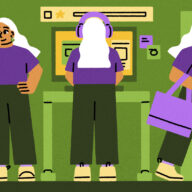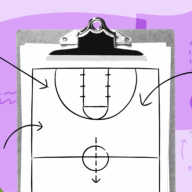Work is no place for a frenemy
Don’t waste your precious time on fake friendships. Instead, learn to set boundaries and collaborate with anyone.
The temptation to slip into a “frenemy” dynamic at work is real – especially now. With economic uncertainty and job insecurity a real concern for many of us, we can easily fall into the trap of seeing our coworkers as competitors.
But it is just that: a trap. Engaging in disingenuous workplace relationships – which may seem friendly on the surface, but are in fact hostile – is a recipe for a toxic environment.
There’s a better way. We’re not required to be besties with all of our coworkers, but we can and should strive for collaborative, civil relationships. In other words: We can be direct and polite, we can set boundaries, and we can get work done – all without secretly plotting against the people on our own team.
What are workplace “frenemies?”
Thankfully, at least one academic has done the work of defining this term for us. According to a study by Jenna Abetz, a frenemy is “a relationship, often negative, steeped in situational ties and shared social connections that outwardly appears friendly but is fraught with underlying competition, jealousy, or distrust.”
Patrice Lindo, CEO of Career Nomad, put it this way: “It can be a wolf in sheep’s clothing.” That’s really what distinguishes a frenemy from a plain old enemy. A frenemy gives the impression of kindness, but it serves only as a facade to mask the negative feelings beneath.
Abetz, a communication professor at the College of Charleston, lays out three key components of a frenemy in her study on the topic:
- Competitiveness: The people in Abetz’s study noted how, “rather than the support, warmth, and care they would have liked from their relationship, their frenemy viewed them as a rival, someone to one-up, outdo, or compare themselves to.”
- Jealousy: Abetz’s study says the focus of jealousy in a frenemy dynamic can vary (perhaps revolving around work performance or material possessions), but that it often “reveal[s] aspects of insecurity within [a] frenemy’s actions.”
- Distrust: The study participants “illustrated that a frenemy is less a ‘hot and cold’ dynamic, and more a relationship where they fundamentally and consistently lacked trust.”
All three of these components are central to the definition of a frenemy. You may have coworkers you feel ambivalent about – they’re not close friends or enemies. But frenemies, Abetz says, are more specific, because they primarily surface feelings of jealousy or distrust.
Work can be a fertile ground for frenemies because of the “situational ties and shared social connections” in Abetz’s definition. Frenemies are often people you’re forced to interact with because they’re part of a bigger social network, like a company or office.
So, how does a “frenemyship” play out at work? Imagine this: You have a coworker you see regularly, maybe even every day. They seem friendly, they might make small talk. But there’s an edge to it, Abetz says: You sense backhanded compliments, you notice subtle sabotage. You find yourself competing with this person for attention and resources. And ultimately, you’re never quite sure where you stand with them.
Why you should resist the temptation to make frenemies
Abetz recognizes that anywhere we have a hierarchical structure and competition for resources, like work, it can be “a fertile ground for frenemy dynamics to flourish.”
But tempting as they may be, we should all strive to avoid making frenemies at work. For one thing, frenemy culture prioritizes surface-level harmony instead of psychological safety. “Companies can often mistake people-pleasing for culture-buiding,” Lindo says. Frenemies reinforce an office culture where the appearance of harmony is more important than actual psychological safety, which gives people the space to respectfully disagree, acknowledge shortcomings, and engage in healthy conflict.
Focusing on a frenemy also wastes your precious time. Using your energy to fake a friendship with someone you don’t like, or trying to impress and out-compete them, can distract you from making progress on your own professional goals.
What to do when someone’s made you their frenemy
So hopefully I’ve convinced you not to make frenemies – but what if you’re on the receiving end of this dynamic? Lindo and Abetz have some advice on how to navigate it:
- Avoid gossip: No need to fan the flames of workplace drama by gossiping with, or about, your frenemy.
- Document your wins: If frenemies develop from a sense of competition, you might be able to lower the temperature by staying focused on your own priorities, and keeping track of your accomplishments. “Make your success undeniable,” Lindo says, as a way of disempowering your frenemy.
- Set boundaries: Create distance from your frenemy by articulating clear boundaries for the relationship, therefore limiting your interactions.
- Curb personal sharing: Always keep your communication courteous, but minimizing the personal details you share with a frenemy can help diffuse interpersonal conflicts, Abetz says.
- Focus on positive relationships: Once you’ve limited your interactions with a frenemy, redirect that energy into your positive work relationships. “Use other colleagues to create a buffer against that negativity,” Abetz says.
What a healthy workplace culture looks like
The alternative to frenemy culture is just as important to understand. “The goal isn’t to turn every coworker into a best friend, or even a friend,” Lindo says.
Instead, we should think about these relationships as ones with mutual respect and collaboration – at least to the extent required to get work done. “Be cordial, absolutely, but it doesn’t require being close,” Lindo explains.
In practice, here’s what that can look like:
- Focus on your shared goals for a project: Neutralize the urge to compete with a frenemy by centering on a shared goal that will help you both professionally.
- Be direct: Don’t allow distrust to fester by keeping up a fake facade. Kindly and assertively communicate your expectations.
- Sharpen your conflict resolution skills: Use these foundational tactics – active listening, clear communication, and empathy – to help you work through disagreements when they inevitably do come up.
- “Keep the main thing the main thing:” Lindo recommends focusing on the results you’re trying to achieve at work, rather than trying to create forced friendships.
Where’s the line between polite and fake?
The whole point of avoiding frenemies is to avoid the fake (or forced) friendships at work that cover up deeper fissures. So don’t mistake the advice to be civil and professional as an excuse to fall right back into frenemy territory.
It’s a fine line, but we should aim to practice empathy and kindness toward all of our coworkers, while keeping our boundaries in place.
Lindo gave an example of a common workplace interaction, the classic, “How was your weekend?” question on Monday morning. If you don’t feel comfortable engaging deeply with a particular coworker, you can be honest without going into detail. In the case of a bad weekend, Lindo suggests saying something like, “It was a tough one, but it’s a new week!” and moving on. Or if someone is oversharing with you, you can rearticulate a boundary by saying, “I appreciate that, but I’m not comfortable with that kind of conversation.”
The important thing is that these types of responses are honest. You’re not lying or pretending, which could help build the trust and clarity that Lindo says are essential for a healthy workplace.














































